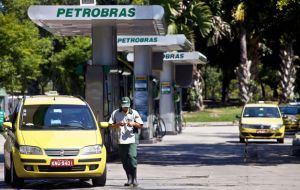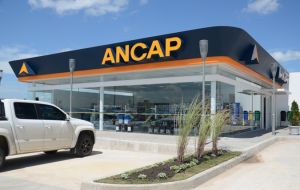MercoPress. South Atlantic News Agency
Petrobras working to match domestic and international fuel prices
 The gap between local and international fuel prices led Petrobras to accumulate debts in recent years as it imported gasoline and diesel and sold them at a loss.
The gap between local and international fuel prices led Petrobras to accumulate debts in recent years as it imported gasoline and diesel and sold them at a loss. Brazil's Petrobras is working to bring domestic diesel and gasoline prices into parity with international levels in order to attract downstream buyers or partners. The oil and gas giant needs to sell assets to survive a combination of mounting debt, low oil prices and a giant corruption scandal.
The root of some of Petrobras financial issues lie in the gap between local and international fuel prices, which led it to rack up debts in recent years as it imported gasoline and diesel and sold them at a loss.
In effect insufficient refining capacity forced Petrobras to import fuels causing a serious mismatch because of frozen prices for the domestic market, mainly for political reasons. For example in neighboring Uruguay gasoline is 30% dearer and diesel for agriculture double Brazilian prices at the border.
“We have a new board of directors made up of market professionals working on this,” Network Planning and Logistics Executive Eric Futino said at an event in Rio de Janeiro, referring to international price parity. “I am working on this with a team made up of technocrats,” he added.
With its current debt level - the highest of any oil company - Petrobras does not have the cash to resolve bottlenecks alone in its fuel distribution network, according to Futino.
Partners or buyers are vital to increase storage and transportation capacity but offers are unlikely to materialize unless fuel prices are in line with international prices. “Investors want certainty over the rules, they don't want to import fuel for one price and have to sell it here for less,” Futino said.
Futino expects interest from retail fuel distributors as they continue to increase their imports of fuel from non-Petrobras refiners.
Third party imports are running at about 200,000 cubic meters a month and total 800,000 to 900,000 cubic meters so far this year. Full-year imports were less than 75,000 cubic meters in 2014 and close to zero in 2010 to 2013.





Top Comments
Disclaimer & comment rules-

-

Read all commentsThe good old commie approach of keeping prices low for the peasants, even if the importer has to take a loss.
Jul 20th, 2015 - 01:19 pm 0Meanwhile. the stinking poor are still getting the hand-outs. Where does this money come from?
I wonder if that well know expert on Brazil, Terence Hill aka The Brainless One, can tell us.
Ha, ha, ha. No chance!
The rest of us KNOW what the answer is, don't we?
He'll be on soon Chris, don't worry.
Jul 20th, 2015 - 10:06 pm 0The PT government obliged PB (as part of their political manipulation of the company) to subsidize fuel prices , keeping them artificially low in order to maintain their (PT) popularity.....no company can operate indefinitely if they sell at a loss.
Commenting for this story is now closed.
If you have a Facebook account, become a fan and comment on our Facebook Page!